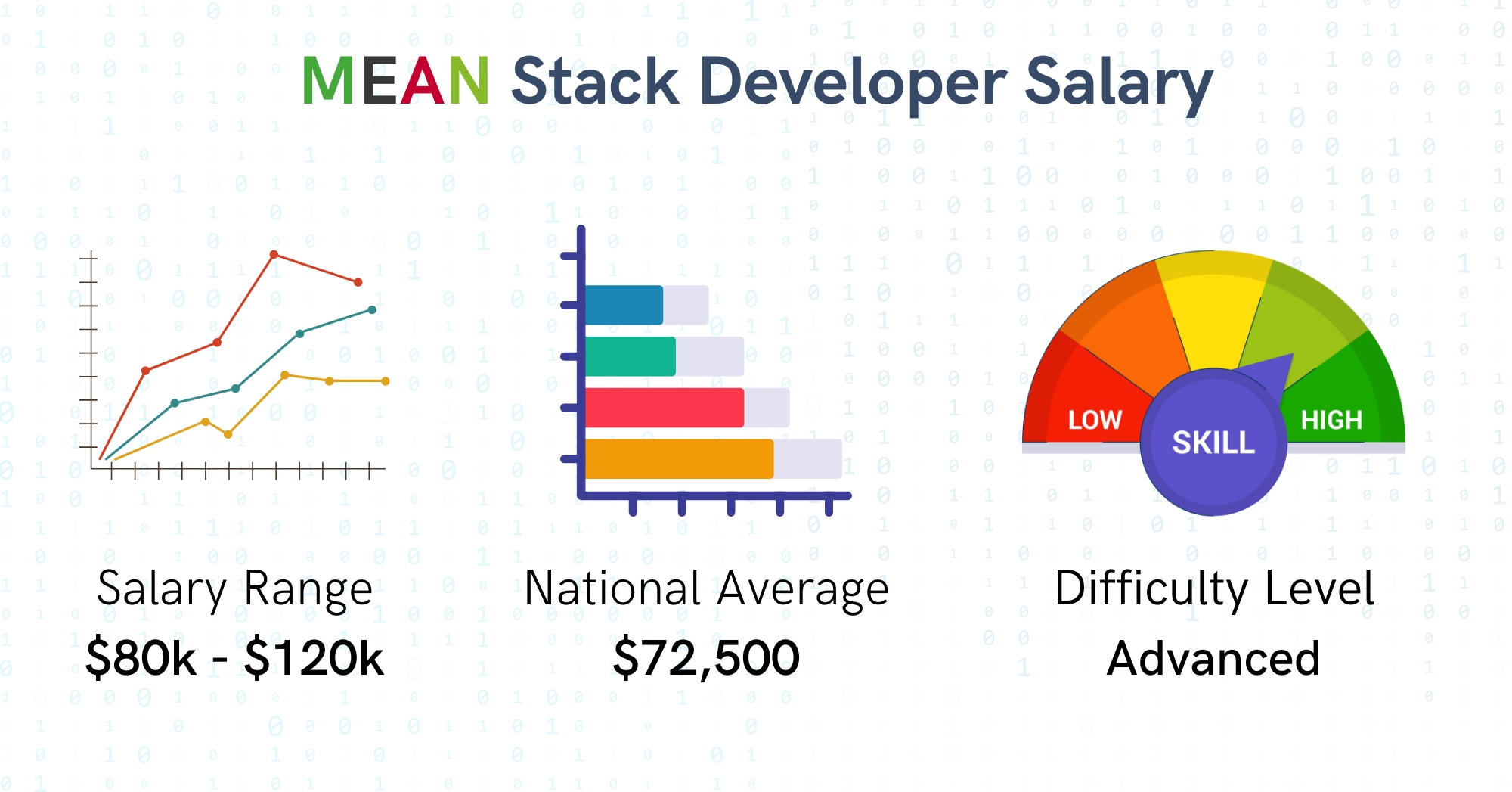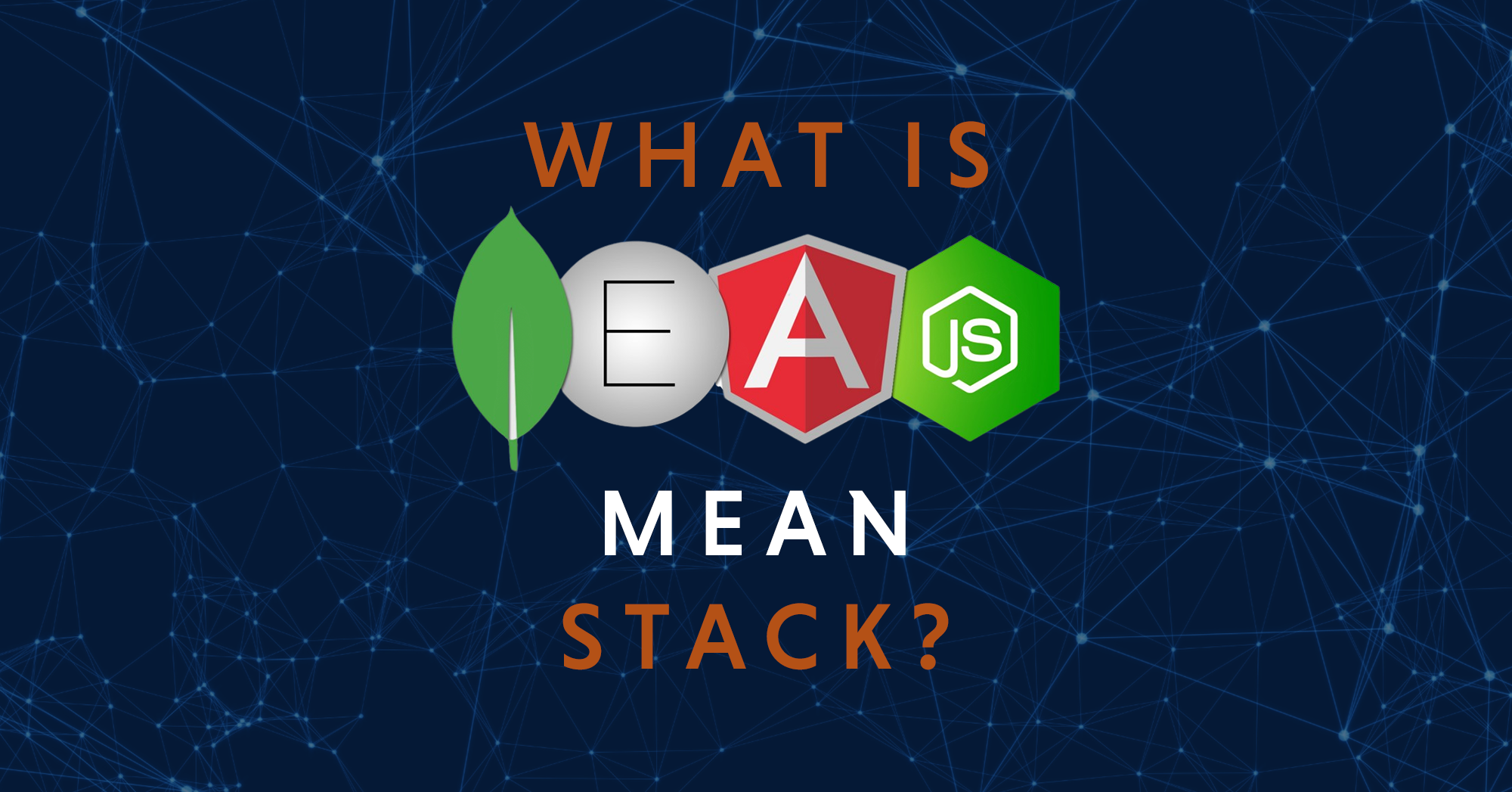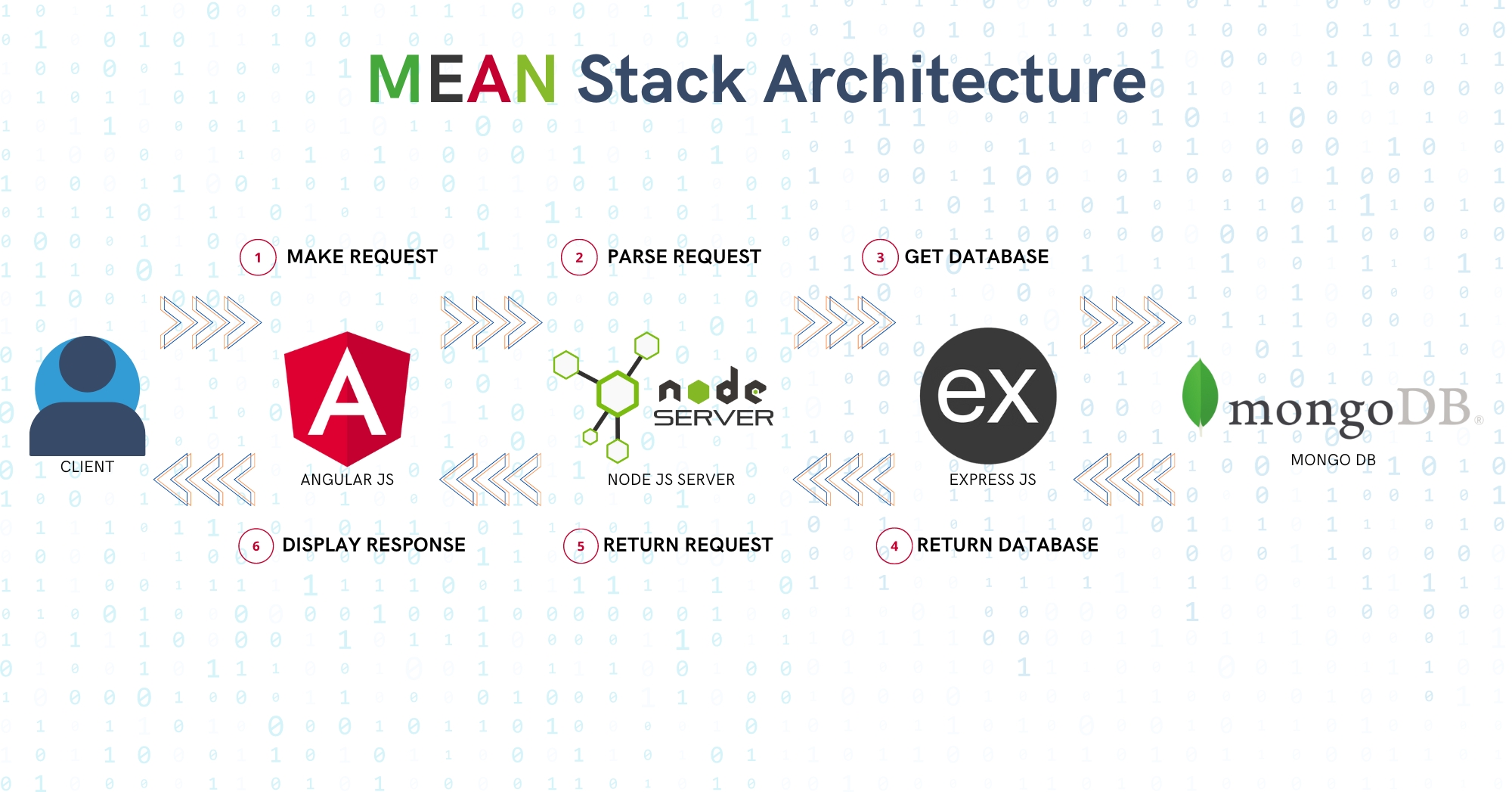Table of Contents
What is MEAN Stack
Mean Stack is a popular and powerful web development technology that consists of four key components: MongoDB, Express.js, Angular, and Node.js. It is a full-stack JavaScript solution for building dynamic and scalable web applications. With Mean Stack, developers can create efficient and flexible web applications using a unified language across the entire stack.
Mean Stack is an ideal choice for web developers who want to build high-performance applications with a modern and flexible architecture. The stack enables developers to work with a range of cutting-edge technologies, including NoSQL databases, RESTful APIs, and real-time web applications.
In addition, Mean Stack offers a range of benefits, including speed of development, ease of maintenance, and scalability. It is also highly SEO-friendly, allowing developers to optimize their web applications for search engines and boost their online visibility.
Overall, Mean Stack is a powerful technology that enables developers to build modern, efficient, and scalable web applications that can meet the needs of businesses of all sizes.
What is a Mean Stack Developer?
A Mean Stack Developer is a web developer who specializes in using the Mean Stack technology to build web applications. The Mean Stack consists of four key components: MongoDB, Express.js, Angular, and Node.js.
MongoDB is a NoSQL database that provides high scalability and flexibility, allowing developers to store and manage large amounts of data. Express.js is a web application framework that simplifies the development of server-side web applications. Angular is a client-side framework that provides a robust and scalable structure for building dynamic and interactive web applications. Node.js is a server-side runtime environment that allows developers to make fast and scalable applications using JavaScript.
A Mean Stack Developer is responsible for designing, developing, and maintaining web applications using these technologies. They work with the full stack, from the database to the user interface, and use their knowledge of JavaScript to create efficient and scalable applications.
The key skills required for a Mean Stack Developer include proficiency in JavaScript, experience with the Mean Stack technologies, and knowledge of web development concepts such as RESTful APIs, MVC architecture, and responsive web design. Mean Stack Developers should also be familiar with modern front-end frameworks such as React and Vue.js, as well as development tools such as Git and Agile methodologies.
In addition to technical skills, a Mean Stack Developer should possess strong problem-solving and communication skills, as well as the ability to work well in a team environment. They should be able to adapt quickly to new technologies and be passionate about learning and staying up-to-date with the latest developments in web development.
Overall, a Mean Stack Developer is a highly skilled and versatile web developer who is capable of building scalable, high-performance web applications using the Mean Stack technology.
What is Mongo DB?
Large volumes of data can be stored and managed using MongoDB database software. It is built to interact with a variety of data types, making it incredibly flexible and able to meet a variety of purposes. MongoDB stores data as documents that resemble JSON and are simple to read and manipulate, as opposed to traditional databases’ use of tables and rows.
The speed of MongoDB is among its best features. You can quickly and simply search through enormous amounts of data since it uses a special indexing technique. Moreover, MongoDB is quite user-friendly. Even if you don’t have much prior database knowledge, MongoDB’s user-friendly interface makes it simple to get started.
Overall, MongoDB is an effective solution that makes it simple to handle significant amounts of data in a flexible and effective manner. MongoDB can assist you in keeping all of your information organized and readily available whether you’re working on a personal project or managing a corporation.
What is ExpressJS?
Building websites and other online applications often use the popular web application framework Express.js. It is speedy and effective because it is developed on top of Node.js. Express.js’s incredible flexibility makes it one of the best tools for creating a variety of apps, which is one of its best features.
Even if you are a complete beginner to web programming, Express.js is really simple to use. It’s easy to get started because of its clear and straightforward UI. Additionally, a sizable community of developers works to expand the functionality and customizability of Express.js by producing plugins and other add-ons.
All things considered, Express.js is a strong framework that makes it simple to quickly and effectively create a wide variety of web apps. Developers of all skill levels should consider Express.js whether they are creating a straightforward blog or a sophisticated e-commerce website.
What is AngularJS?
AngularJS is an open-source internet utility framework it is used to construct dynamic and interactive internet pages. It is designed to make net development faster and simpler, using a powerful set of equipment and functions. One of the critical blessings of AngularJS is that it allows builders to create single-web page programs that load quickly and work seamlessly.
AngularJS is built on top of JavaScript, which makes it really flexible and adaptable. It uses plenty of pre-constructed components and directives that make it smooth to create complex consumer interfaces without having to write a number of codes. Plus, AngularJS has a huge and lively network of builders who create plugins and other accessories, making it even more powerful and customizable.
Normal, AngularJS is a top-notch device for constructing web packages that are each attractive and green. Whether you’re constructing an easy weblog or a complex e-commerce website, AngularJS lets you create a dynamic and interactive experience for your users.
Looking to Hire an Angular Development Team?
Share the details of your request and we will provide you with a full-cycle team under one roof.
What is NodeJS?
NodeJS is a popular open-source runtime terrain that allows inventors to run JavaScript law outside of a web cybersurfer. It’s designed to be fast and effective, using a non-blocking, event-driven I/O model that makes it ideal for erecting scalable network operations. One of the stylish effects of NodeJS is that it allows inventors to use the same language on both the customer and garçon side, which can help streamline the development process.
NodeJS is erected on top of Google’s V8 JavaScript machine, which makes it really presto and effective. It also has a large and active community of inventors who produce plugins and other add- ons that make it indeed more important and customizable. NodeJS can be used to make a wide range of operations, from simple command-line tools to complex web operations.
Overall, NodeJS is a great tool for erecting scalable network operations that are both fast and effective. Whether you are erecting a simple converse operation or a complexe-commerce point, NodeJS can help you produce a robust and dependable operation that can handle a lot of business.
Mean Stack Architecture
MEAN stack architecture is a popular and powerful combination of technologies that are used to build robust and scalable web applications. Let’s discuss 10 major points.
- MEAN mound armature is a popular combination of technologies used for erecting web operations.
- It consists of four main factors MongoDB, ExpressJS, AngularJS, and NodeJS.
- MongoDB is a largely scalable and flexible NoSQL database that is great for large-scale operations.
- ExpressJS is a fast and customizable web operation framework used for erecting the backend of the operation.
- AngularJS is a customer-side framework that is used to make the front end of the operation, furnishing fast and responsive stoner interfaces.
- NodeJS is used to power the server side of the operation, using a non-blocking, event-driven I/ O model that is ideal for erecting scalable network operations.
- By combining these four technologies, inventors can produce presto, scalable, and flexible web operations.
- MEAN mound is open-source and extensively supported, with a large community of inventors and coffers available.
- It’s a great choice for erecting ultramodern, data-driven web operations that can handle a lot of business and data.
- MEAN mound is also largely adaptable, with each element being exchangeable with other compatible technologies.
 How much does Mean Stack Developer make?
How much does Mean Stack Developer make?
Salary: As mentioned earlier, the average annual salary for a Mean Stack Developer ranges from $80,000 to $120,000. However, the salary can vary based on several factors such as location, years of experience, and company size. For example, Mean Stack Developers working in cities like San Francisco or New York tend to earn higher salaries compared to those working in smaller cities. Additionally, companies with larger teams and more complex projects may offer higher salaries to attract and retain top talent.
Skills and experience: The salary for Mean Stack Developers can also depend on their specific skills and experience. Developers who have experience with the latest technologies and frameworks, such as Angular or React, may earn more than those with more limited experience. Similarly, developers with experience in a specific industry or domain, such as healthcare or finance, may command higher salaries due to their specialized knowledge.
Job outlook: The job outlook for Mean Stack Developers is quite positive. As more businesses move their operations online and seek to develop web-based applications and services, the demand for skilled developers who can work with the MEAN stack is likely to continue to grow. This means that Mean Stack Developers can expect to see a steady stream of job opportunities and may be able to negotiate higher salaries as the demand for their skills increases.

Overall, Mean Stack Development is a lucrative career choice with a positive job outlook. Developers who stay up-to-date with the latest technologies and frameworks and are willing to continually develop their skills and knowledge can expect to earn competitive salaries and enjoy plenty of job opportunities.
What is the Future of Mean stack Developer?
The future of Mean stack developers looks promising as the demand for full-stack development continues to rise. The MEAN stack offers a complete solution for web application development and has gained popularity in recent years.
As more and more businesses and organizations adopt cloud computing and digital transformation, the need for robust and scalable web applications will only increase. This means that Mean stack developers, who possess expertise in the latest web development technologies and tools, will be in high demand.
In addition, the MEAN stack is open-source and has a large and active community of developers constantly working on improving it. This ensures that the technology stack will continue to evolve, providing Mean stack developers with new opportunities to innovate and create more efficient and effective solutions.
Overall, the future of Mean stack developers seems bright, with plenty of job opportunities and potential for growth and advancement. As long as businesses continue to rely on web applications to run their operations, the demand for Mean stack developers will remain strong.
Pros and Cons of Mean Stack
Advantages of Mean Stack
- Full-stack development: With the Mean stack, developers can handle both front-end and back-end development, which can save time and resources.
- Open-source technology: The Mean stack is open source, which means that developers can use, modify and distribute it freely.
- JavaScript-based: As the Mean stack is based entirely on JavaScript, developers can write code using a single language, making it easier to learn and maintain.
- Scalability: Mean stack provides a high degree of scalability, allowing developers to easily scale up or down their applications according to demand.
- Reusability of code: The use of common technologies across all layers of the Mean stack allows for easier sharing and reuse of code.
- Community support: With a large and active community, developers can get help and support on forums, blogs, and other resources.
- Flexibility: The Mean stack provides developers with the flexibility to choose the tools and technologies they prefer, making it easier to customize applications.
- Real-time web applications: Mean stack supports the development of real-time web applications, which can be updated instantly without the need for refreshing the page.
- Faster development time: Mean stack simplifies the development process and can help developers to deliver projects more quickly.
- Cost-effective: As Mean stack is based on open source technologies, it can be a cost-effective option for businesses looking to develop web applications.
Disadvantages of Mean Stack
- Steep learning curve: As with any new technology, there is a learning curve associated with Mean Stack, and it can take some time to become proficient.
- Limited scalability: Mean Stack may not be the best option for larger, more complex projects due to its limited scalability.
- Limited third-party support: Compared to some other web development stacks, Mean Stack has limited third-party support, which can make it difficult to find solutions to specific problems.
- Dependency management: Mean Stack is dependent on multiple technologies, and managing these dependencies can be complex and time-consuming.
- Security concerns: Mean Stack can be vulnerable to security threats if not properly secured, which can lead to data breaches and other security issues.
- Lack of mature tools: Some of the tools used in Mean Stack are relatively new, which means that they may not be as mature or stable as those in other web development stacks.
- Debugging can be challenging: Debugging Mean Stack applications can be challenging, as it requires knowledge of multiple technologies and systems.
- Maintenance can be difficult: Mean Stack applications require regular updates and maintenance, which can be time-consuming and challenging.
- Limited flexibility: Mean Stack may not be the best choice for projects that require a high degree of flexibility or customization.
- Limited community support: Compared to some other web development stacks, Mean Stack has a smaller community of developers, which can make it more difficult to find support and resources.

 How much does Mean Stack Developer make?
How much does Mean Stack Developer make?